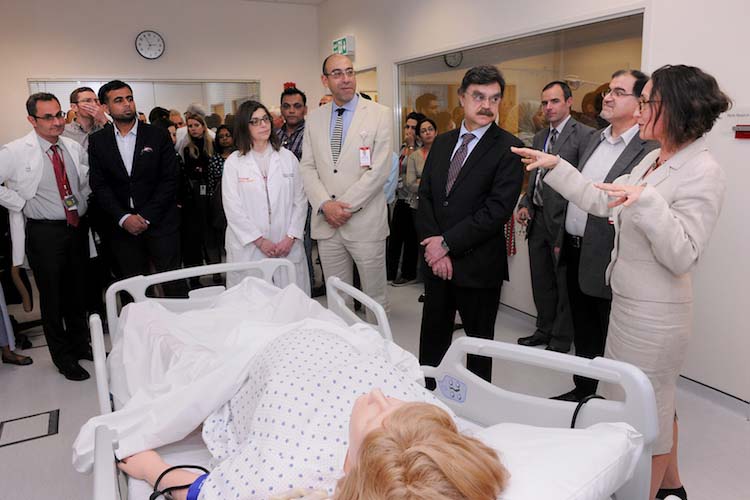Students at Weill Cornell Medicine-Qatar (WCM-Q) are now learning to become doctors in one of the region’s most technologically advanced facilities after the college launched its modernised Clinical Skills and Simulation Lab (CSSL).
The newly-expanded and upgraded state-of-the-art facility is now equipped with a wider selection of cutting-edge teaching aids that simulate real-world clinical situations, allowing students to gain the practical skills they need in a risk-free environment under the guidance of WCM-Q’s highly trained teaching faculty.
The hi-tech equipment includes lifelike medical mannequins that are able to simulate a vast range of symptoms, from a racing heartbeat and dilated pupils, to a swollen tongue or a full-blown seizure, among many others – all controlled remotely by a technician. Students working with mannequins can practice responding to an almost limitless array of conditions as if they were in a real ER (emergency room).
The CSSL, formerly known as the Clinical Skills Center, has been expanded from 8,500 to 10,500 square feet and now has 12 clinical examination rooms, up from six previously. Each examination room is fully equipped with diagnostic instruments for examining the ears and eyes and measuring blood pressure and temperature. Students learn to utilise these instruments under instructor supervision and with the help of ‘standardised patients’ – individuals trained to play the role of patients.
Other facilities in the revamped suite include hi-tech training aids where they can practice to administer joint injections, taking blood samples, inserting intravenous lines and using portable ultrasound machines. There is also a cardiopulmonary patient simulator and a variety of 3D anatomical models.
Dr Stella Major, Associate Professor and Director of the CSSL said that the expanded space permits more students to engage in simulation-based educational activities at any one time, requiring less time taken from their busy curricular schedules.
Simulation-based learning is a key emerging trend in the education of medical practitioners and numerous other health professions. Research has shown that students who practice and retain their expert skills in a simulated environment have markedly higher success rates in performing a variety of medical procedures and a dramatic reduction in errors in patient care.
Lan Sawan, Manager of the CSSL said they are very pleased that they now have this ‘extremely advanced facility’ which help students gain the practical skills they need to provide world-class care to patients.
The CSSL also has a newly updated high-definition audio-visual system with remotely controlled cameras placed in strategic locations. This allows evaluators to discreetly observe and evaluate students without disturbing learning activities. Students can reflect on their own skills by accessing their videos from college premises, helping them to identify and address their skill gaps and reinforce their strengths.
Enhancing and expanding the CSSL complements the integrated Six-Year Medical Program at WCM-Q, which place more emphasis on the attainment of practical physicians skills than traditional medical curricula. Upon graduation, students receive the same MD degree awarded to students at the Weill Cornell Medicine campus in New York.
For more information about this new facility, visit the WCM-Q website.









